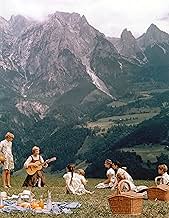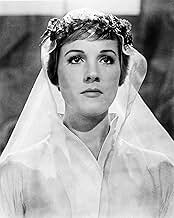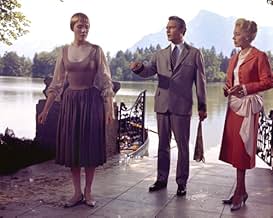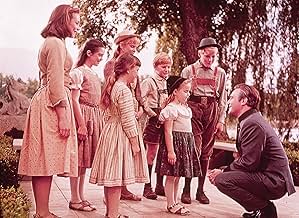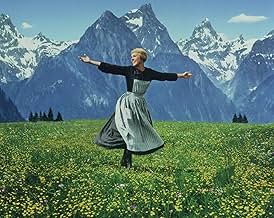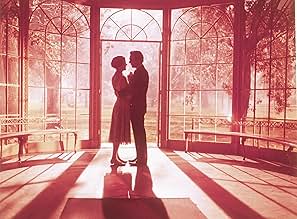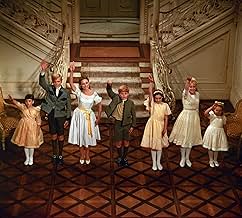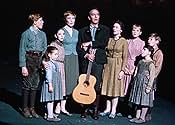Uma mulher deixa um convento austríaco para se tornar a instrutora dos filhos de um oficial da marinha viúvo.Uma mulher deixa um convento austríaco para se tornar a instrutora dos filhos de um oficial da marinha viúvo.Uma mulher deixa um convento austríaco para se tornar a instrutora dos filhos de um oficial da marinha viúvo.
- Ganhou 5 Oscars
- 18 vitórias e 13 indicações no total
Heather Menzies-Urich
- Louisa von Trapp
- (as Heather Menzies)
Gilchrist Stuart
- Franz
- (as Gil Stuart)
Best Picture Winners by Year
Best Picture Winners by Year
See the complete list of Best Picture winners. For fun, use the "sort order" function to rank by IMDb rating and other criteria.
Enredo
Você sabia?
- CuriosidadesChristopher Plummer accidentally said the word "Captain" to Julie Andrews during the argument scene. Despite the error, producer and director Robert Wise thought it was that amusing, and liked it so much, he kept it in the movie.
- Erros de gravaçãoGeorg von Trapp was an officer in the Austro-Hungarian Imperial Navy in World War I, commanding ships based from ports on the Adriatic coast of Croatia, an Imperial province. In 1918, the Empire was dissolved, leaving Austria a landlocked country, and Von Trapp out of a job in the process. "Austrian Navy" sounds like an oxymoron to viewers unaware of the historical context.
- Cenas durante ou pós-créditosThe 20th Century Fox logo is played in complete silence.
- Versões alternativasThe 1996 video fits the movie onto one VHS cassette by removing the Intermission screen as well as the Entr'acte.
- ConexõesFeatured in Film Review: Julie Andrews (1967)
Avaliação em destaque
The "Sound of Music" is set in the mountainous hills and the city of Salzburg, Austria. There is to my eye at least, something about its spacious alpine countryside which dominates and informs the entire production. The air, the light, the music, the styles of dress, the activities--everything is "elevated", with hardly anything being sea-level about it. And the film has a very good "engagement sequence" at the opening, when we learn about the central ethical character and experience her leaving the abbey where she has served along with her, and begin to care about her purposes. The story-line is simple and relatively direct: A young nun, unsuited to the profession, takes a job as a governess to the children of a difficult client--a captain in the Austrian navy who runs the household like a ship's company of sailors, complete with a bosun's whistle and a lineup of the children in matching uniforms. The body of the piece is then concerned with Maria, the governess, subverting the household and winning over the Captain until he gives up his present lady friend, a Baroness; then when Maria, who has been falling in love with him, goes away and comes back, he has to tell her he is in love with her also. They marry, to the children's delight in a great ceremony in a rebuilt replica of Salzburg's cathedral; but a Nazi Parrty official has words with the Captain. The family, against the Captain's former feeling, then enters the Sazlburg musical festival as the Von Trapp Family singers, something he had earlier opposed; and, winning the contest, they flee and are helped at her old abbey by Maria's Prioress and her friends there. The nuns sabotage the Nazis' cars by stealing parts, and Captain Von Trapp leads his family up over the mountain pass to freedom as the film ends. This happy film is filled with tuneful songs ranging from the ultra-simple "Eidelweiss" ballad to "How Do You Solve a Problem Like Maria" , "Do Re Mi", "My Favorite Things", "The Sound of Music", "I Have Confidence", "The Lonely Goatherd", "Something Good", "Sixteen Going on Seventeen" and the voice-challenging "Climb Every Mountain". Robert Wise directed this complex film, which features many sorts of scenes. Everything to me looks clean, bright and, frequently, even Austrian. Ernerst Lehman wrote the screenplay from the Broadway "book" by Howard Lindsay and Russell Crouse that borrowed its fictionalized biography from Maria Augusta Trapp's autobiographical work; Richard Rodgers and Oscar Hammerstein II supplied the music and lyrics. Ted McCord provided lucid cinematography, with the production being designed by Boris Leven. Ruby R. Leavitt and Walter M. Scott did the complex set decorations while famous Dorothy Jeakins created the many vivid costumes. In the large cast, Julie Andrews was a charming Maria, though she was not particularly Austrian. Christopher Plummer had some very good moments as the Captain, Eleanor Parker played the Baroness with great skill and Richard Haydn was the Captain's impresario friend, Max. Ben Wright was the Nazu gauleiter, Peggy Wood the Mother Superior, and among the nuns were Anna Lee, voice-dubbing soprano Marni Nixon, Evadne Baker and Portia Nelson., In the cast also were Daniel Truhitte, Norma Varden, Gilchrist Stuart as Franz the butler, with the children Charmian Carr, Nicholas Hammond, Angela Cartwright, Heather Menzies, Duane Chase, Debbie Turner, and Kym Karath. It is a bit difficult for me as a writer to account for the highly-positive qualities of the film, since in my judgment they exceed the sum of the film's parts. The characters and relationships seem real to the viewer, I suggest, because we discover them along with Maria; her personal dilemmas are interesting, and the use of the Nazi Anschluss as a threat, a problem for the Captain, and a dark cloud hanging over the sunlit lives of the folk in the film works very well. The contrast for instance between the nuns' early disagreement over Maria's character and their helping to thwart the Nazis pursuing the family at the film's climax becomes a highly-symbolic movement; and like the growing love between Maria and the Captain and the children's being won over by their new governess, because the movement again is allowed to develop by slow stages, the satire-level comedy with its touch of drama works powerfully on an audience. There is much to be admired in the simplicity and the beautiful imagery of this film; if it is not an artistic masterpiece, it is frequently absorbing, moving and unaffected all at the same time.
- silverscreen888
- 10 de ago. de 2005
- Link permanente
Principais escolhas
Faça login para avaliar e ver a lista de recomendações personalizadas
Detalhes
- Data de lançamento
- País de origem
- Centrais de atendimento oficiais
- Idiomas
- Também conhecido como
- La novicia rebelde
- Locações de filme
- Felsenreitschule, Salzburgo, Áustria(music festival scenes)
- Empresas de produção
- Consulte mais créditos da empresa na IMDbPro
Bilheteria
- Orçamento
- US$ 8.200.000 (estimativa)
- Faturamento bruto nos EUA e Canadá
- US$ 159.287.539
- Fim de semana de estreia nos EUA e Canadá
- US$ 413.497
- 9 de set. de 2018
- Faturamento bruto mundial
- US$ 159.484.051
- Tempo de duração2 horas 52 minutos
- Cor
- Proporção
- 2.20 : 1
Contribua para esta página
Sugerir uma alteração ou adicionar conteúdo ausente








